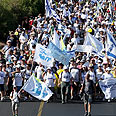Prime Minister Benjamin Netanyahu on Thursday evening presented his position on the negotiations for the release of abducted IDF soldier Gilad Shalit, four days after the protest march for Shalit's release took to the road."We all want to bring Gilad back, but I bear general responsibility," he said.
Netanyahu, who will talk with US President Barack Obama about the issue on Monday, gave the soldier's family little reason for optimism, and explained why the decision is so complex.
However, Gilad's father Noam expressed his disappointment in the prime minister's words, saying that Netanyahu was merely recycling what former Prime Minister Ehud Olmert had said. Hamas, for its part, claimed the prime minister was merely trying to manipulate public opinion.
"I look into the pained eyes of Shalit's family and feel the pain with them," Netanyahu said during the speech. "I also look into the eyes of hundreds of families who have been hurt by terror and feel their pain. In the same breath, I think of all those whose loved ones will be murdered if Israel's principles are breached and murderers are released. As prime minister, I must take all this considerations into account."
"The call to pay any price is a natural cry from the hearts of his fathers, mothers, grandparents, brothers and sisters," he continued. "As a brother, as a father, as a son, I understand this cry from the depths of my heart. But before me I see, as does every Israeli prime minister, the security of all the State's citizens. The State of Israel is willing to pay a heavy price for the release of Shalit, but it cannot say 'at any price.' This is the truth, and I am saying it now. We will continue to make every effort… to bring Gilad home quickly. But this will be done while maintaining the security of Israel's citizens."

Netanyahu. 'Difficult and complex decision' (Photo: Gil Yohanan)
"The people of Israel are united in their desire to bring Shalit home," the prime minister confirmed. "There in nobody who has met the Shalit family who doesn't think to himself, 'Gilad could have been my son, or my brother, or my grandson.' Therefore the family's response is natural, and the desire to give them support is also natural."
Netanyahu, who said he had agreed to a deal which would involve the release of 1,000 Palestinians, also spoke about the dangers of releasing prisoners.
'Half went back to terror'
"Israel has decided a number of times to release terrorists and murders in return for the release of Israelis," he said. "The most famous case is the Jibril deal, in which 1,150 were released. Almost half went back to terror. They went back to murdering hundreds of Israelis and constituted the hard core of the second Intifada. And there were other cases, like the Tenenbaum deal, in which 400 were released, and murdered 26 Israelis since they were released in 2004."
"The decision to release terrorists is a difficult and complex decision for any government," Netanyahu continued. "Because of the complexity, as opposition leader I refused to criticize the Olmert government on this issue. The public pressure and demands should not be directed against the government, but against Hamas – a terror organization that does not even allow the Red Cross to visit Shalit."
"In the deal presented by the German mediator, to which I agreed, there were 1,000 terrorists – that's the price I am willing to face to bring Shalit home," the prime minister added, but clarified that he would not agree to their return to the West Bank. "I stick to two principles – the terrorists must not return to Judea and Samaria, and no arch-terrorists will be released. I agreed to the mediator's deal, but no response has yet been received from Hamas."
Liebman: 'Expected more'
Gilad Shalit's father Noam expressed his disappointment in Netanyahu's words.
"Bibi is just recycling what Olmert said," he said. Shalit's parents did not watch the speech but received updates on what the prime minister was saying while marching through Emeq Hefer together with hundreds of supporters who joined them for a protest march from Mitzpeh Hila to Jerusalem.
"Those marching with us who are here now are the answer," Noam Shalit said in response. "Netanyahu's speech is a 'once in four years' speech. I thank all supporters and all those who will join us until we reach Jerusalem."
"We expected more from him, some words to the family," said Shimshon Liebman, head of the Shalit campaign. "We thought he would say he would do everything, now, quickly, to bring Gilad home."
Liebman also clarified that the march to Jerusalem was not directed against the prime minister.
"This is not a political march, it's a march in support of you," he said. "Be courageous, there's a lot of strength here, use it, you'll be a great leader – and we'll be a great nation, because we deserve it."
Thousands of marchers accompanied the Shalit family during the last few days in their protest march to Jerusalem. On Thursday, some 3,000 marched in the Sharon region.
"I have no doubt that the number of people marching with us, standing at the side of the road and sounding their horns (in support) is matched by the numbers in Jerusalem," said Liebman.
Hamas also commented on Netanyahu's speech, saying the prime minister was "trying to manipulate Israeli public opinion."
Hamas spokesman Ismail Radwan said that "there was nothing new in Netanyahu's speech. If Israel wants a deal it must accept the demands set by the Palestinian organizations."
Palestinian sources familiar with the prisoner exchange negotiations told Ynet no progress has been made.
Gilad Shalit was captured 1,467 days ago.
Ali Waked also contributed to this report.

















